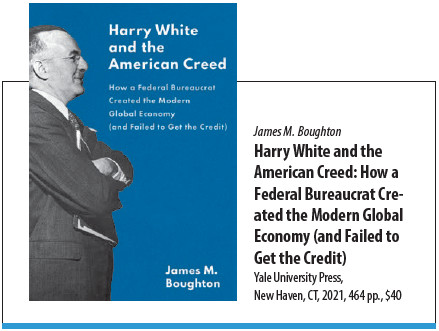Harry White and the American Creed: How a Federal Bureaucrat Created the Modern Global Economy (and Failed to Get the Credit)

Standing on pedestals in the anteroom of the IMF’s Executive Board are two bronze busts: one of John Maynard Keynes, the other of Harry Dexter White. While innumerable books and biographies have been written about the former, much less is known about the latter. Former IMF Historian James Boughton redresses this imbalance in his superb biography—Harry White and the American Creed.
In the first part of the book, we learn about White’s early years, including his humble origins; White started his higher education only in his late 20s, after serving in World War I. He attended Columbia, Stanford, and Harvard, where he was awarded the prize for the best PhD dissertation in 1932. Despite his academic pedigree, during the Great Depression jobs were hard to come by, and White ended up teaching at a small college in Wisconsin. He got his big break when famed economist Jacob Viner invited him to intern at the US Treasury for three months in the summer of 1934. It is a testament to White’s intelligence, drive, and ambition that, during his internship, he produced a 400-page report on what monetary system the United States should have.
The internship was the entrée to White’s signature achievement: his contribution to shaping the postwar international monetary order decided at the Bretton Woods Conference. A doggerel found among White’s papers ran, “In Washington Lord Halifax once whispered to Lord Keynes, ‘it’s true they have the money bags, but we have all the brains!’ ” Boughton sets out to debunk this claim, crediting White with four main insights: that the postwar system needed to be designed while war was still being waged; that it would need to be designed by all the allied nations, and not just presented as a fait accompli negotiated between Britain and the United States; that it should promote multilateral trade and payments; and that it should be based on the US dollar, rather than some new, artificial international currency. While one might question the wisdom of basing the international monetary system on the currency of a single country (even one as powerful as the United States), White’s instinct that Congress would otherwise never ratify the IMF’s Articles of Agreement was probably correct.
The book also addresses the charges at the end of White’s life—and that likely ended his life—of being a Soviet agent. Here Boughton does a meticulous job of documenting every charge and insinuation to show how flimsy (and often ridiculous) they were. As Boughton concludes, “if White was a spy, he was very bad at it…for a man who was so good at everything he applied himself to doing, to accuse him of such an agency would be the unkindest charge of all.”
Boughton’s book is a fine piece of scholarship that reads like a thriller. And whatever else one takes away from it, one conclusion is clear: it is quite right to honor White alongside Keynes.
Opinions expressed in articles and other materials are those of the authors; they do not necessarily reflect IMF policy.








